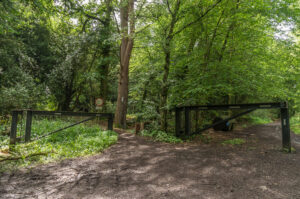The Abinger Chronicle is not one of those magazines which give you a bang for your sixpence. Those want buffetings must procure them elsewhere; several excellent periodicals purvey them, and liberally. Abandon all despair, ye who enter here. Expect a more temperate response. Here is nothing cosmic, basic, mantic, maieutic, materially dialectic, cataclysmic, seismic. This accords well with the soil of our parish, which consists of greensand and of chalk, and is unpropitious to earthquakes.
Since the days of King John, who once behaved very badly indeed near Paddington Farm, tragedy has averted her face. The Tillingbourne is too shallow to get drowned in, the banks of the Smugglers’ Lane too sloping to be leapt off fatally, and though there are wells, millponds, quarries, a tower upon Leith Hill and several high Wellingtonia Firs, these may not rank as natural dangers; they are artificial death-traps which have been constructed by man for his own destruction, often unsuccessfully. Similarly with the mechanically-propelled vehicles which certainly do rush along at lethal speeds; they have always gathered impetus outside the parish boundaries, and similarly with the aeroplanes. Left to itself, there is not a safer place in England than Abinger, and it would be unfitting if it produced a volcanic chronicle.
Yet if not a bang, there is a whimper. On the back of this journal there is sometimes printed a wood-cut of a ferocious animal—of a bull, even of a lion. “M’m, Under other circumstances I might injure you almost fatally” it seems to snarl. And similarly with the back of our country side. Here and there in this ten-mile ribbon of fluffy Surrey, comes a rumble of occurrences below. One of these rumbles is at Holmbury Camp, where the brow of the heathland is furrowed by neolithic frowns. The other, better known to me, is at Blind Oak Gate.

Blind Oak Gate lies at the extreme north. The tracks leading up to it from the south climb up the clean chalk of the downs, and the sun shines into their ruts. Then begins a brash of bushes—hawthorn, sloe, bramble, heightening into holly and ash, and the sunlight gets frittered away. The ridge of the downs is crossed inadvertently, and after a hundred yards the traveller—for he has become a traveller—reaches this queer clearing. It slopes and slides, descending to the quarter of the north. It has no special shape. Eight or ten paths converge on it—some so unobtrusive that they fail to get counted. It is surrounded by trees, some of which are big, and many of which are undamaged. Tucked away at the top of it is a pond. The pond is small and shallow, and pretty ranunculus cover it in June. But what is it doing up hill? Like the paths, it is trying to hide itself. It is the centre of the whole affair, if affair there be. When the traveller has passed, the pond rises on its elbow and looks around it. When he returns, it lies back, and only a dribble through silver-weed reveals its dubious bed.
Many years ago, at Cairo, I encountered as a traveller the ruinous Mosque of Amr. The neighbourhood was deserted, the sunlight violent. I stood outside the enclosure and peeped. There was nothing particular to look at—only old stones—but peace and happiness seemed to flow out and fill me. Islam means peace. Whatever the creed may have done, the name means Peace, and its buildings can give a sense of arrival, which is unattainable in any Christian church, The tombs at Bidar give it, the Gol Gumbaz at Bijapur, the Shalimar Gardens at Lahore, the garden-houses at Aurangabad. But it came strongest from the Mosque of Amr, and I learnt afterwards, with superstitious joy, that others, besides myself, had noticed this; that the Mosque had been in early days the resort of the Companions of the Prophet; that the sanctity of their lives had perfumed it; that the perfume had never faded away. Anyhow, I remember the feeling and am grateful for it, and mention it now because it is the exact opposite of the feeling I get at Blind Oak Gate. No peace here. Only a sense of something vaguely sinister, which would do harm if it could, but which cannot, this being Surrey; of something muffled up and recalcitrant; of something which rises upon its elbow when no one is present and looks down the converging paths. Anyone who knows the novels of Forrest Reid will realise what I am trying to say. He, better than any living author, can convey this atmosphere of baffled malevolence, this sense of trees which are not quite healthy and of water which is not quite clear. Yes—something is amiss. Our parish ingredients have been wrongly combined for once, and I can’t honestly say I am sorry.
The Blind Oak and the Gate, which lent their names to the clearing, are both gone. The oak goodness knows when. The gate was pulled up for a lark by a boy who is now a middle aged tradesman. He and some other boys set to work and dragged it over the crest of the downs to the great chalk pit on the southern slope, where they crashed it. The place, deserted by its sponsors, has been left to its very own self, and who knows what it is up to during autumn nights? Not I. But I have sometimes stood there of a late afternoon, and flirted with the shadow of the shadow of evil. When I can go there no longer, I shall still remember it : it will remain as a faint blur opposite the calm cleansing sunlight of the Mosque of Amr. And when its trees are cut down and its pond emptied and its levels altered, it will not exist anywhere except in my memory. Cursing feebly, Blind Oak Gate will have been cleaned up for ever, and I can’t honestly say I shall be glad. E, M. FORSTER
From The Abinger Chronicle Vol. 1, No. 7 June 1940

If you would like to apply for a Login account to help update this site, please email the web team here.